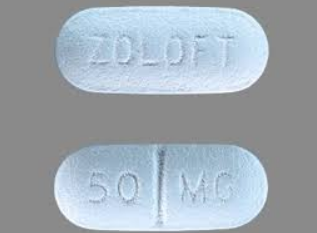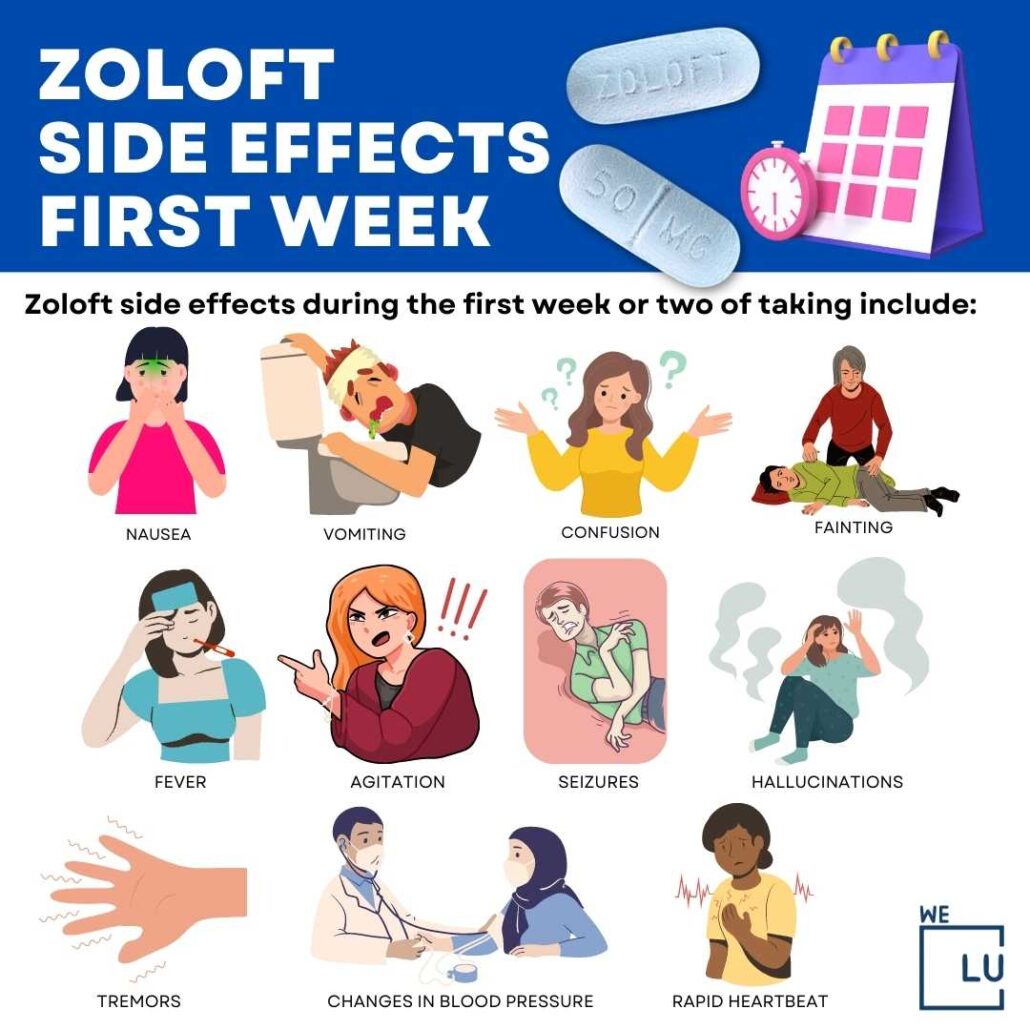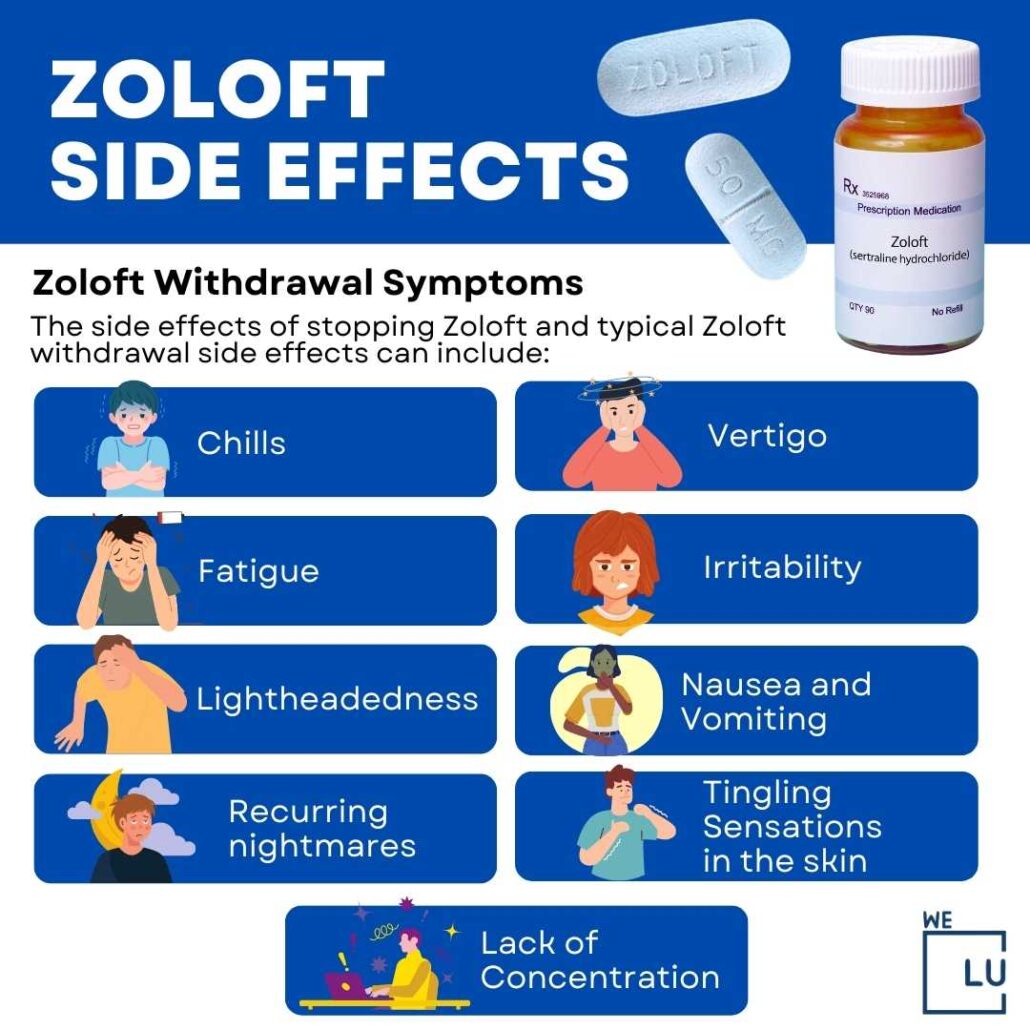Determine the Best Time of Day to Take Zoloft for Anxiety
The best time of day to take Zoloft for anxiety usually varies from person to person. However, taking it in the morning is generally recommended because it can cause insomnia or difficulty sleeping if taken at night. You should always take Zoloft as your doctor directs and follow their instructions carefully. If you have any concerns or questions about the timing of your medication, you should consult your doctor or a healthcare professional.
As individuals and healthcare providers seek to optimize its benefits, two questions stand out prominently: What is the optimal time of day to take Zoloft for anxiety relief, and how long does it take for the medication to exhibit its full effects? Delving into these queries not only sheds light on the nuances of Zoloft administration but also empowers those navigating its potential benefits. In this article, we explore the intricate relationship between timing and effectiveness, offering insights into determining the most suitable course of action when embarking on a Zoloft journey for anxiety management.
How Long Does It Take for Zoloft to Work?
The timeframe for Zoloft to exhibit its full therapeutic effects can vary from person to person. Generally, individuals often notice some initial changes within the first few weeks of starting the medication. However, it typically takes around 4 to 6 weeks for Zoloft to reach its full efficacy in alleviating symptoms of anxiety and depression.
During the initial weeks of treatment, some individuals might experience side effects before the positive effects become noticeable. These side effects could include mild gastrointestinal discomfort, changes in appetite, sleep disturbances, or increased anxiety. Individuals must communicate any side effects they experience with their healthcare provider, as adjusting the dosage or addressing side effects can be part of the treatment process.


Skip To:
Learn More:
Get Help. Get Better. Get Your Life Back.
Searching for Accredited Dual Diagnosis Mental Health Centers Near You?
Even if therapy failed previously, or are in the middle of a difficult crisis, we stand ready to support you. Our trusted behavioral health specialists will not give up on you. When you feel ready or just want someone to speak to about counseling alternatives to change your life call us. Even if we cannot assist you, we will lead you to wherever you can get support. There is no obligation. Call our hotline today.
FREE 24/7 Dual Diagnosis Mental Health Services HotlineAnxiety and Zoloft Fact Sheet
What is Anxiety?
- Anxiety is a normal and often temporary response to stress or a perceived threat.
- It involves feelings of unease, worry, fear, or apprehension.
- Anxiety becomes a concern when it is persistent, excessive, and interferes with daily life.
Types of Anxiety Disorders:
- Generalized Anxiety Disorder (GAD):
- Characterized by excessive, uncontrollable worry and anxiety about various aspects of life.
- Symptoms may include restlessness, irritability, muscle tension, fatigue, and difficulty concentrating.
- Panic Disorder:
- It involves recurrent and unexpected panic attacks and intense periods of fear or discomfort.
- Panic attacks can cause rapid heartbeat, sweating, shortness of breath, chest pain, and a sense of impending doom.
3. Social Anxiety Disorder (SAD):
Involves an intense fear of social situations and of being judged or embarrassed.
People with SAD may avoid social interactions, leading to significant distress and impairment.
4. Obsessive-Compulsive Disorder (OCD):
Characterized by intrusive thoughts (obsessions) and repetitive behaviors (compulsions) performed to alleviate anxiety.
OCD can interfere with daily activities and cause significant distress
Zoloft Dosage for Anxiety
For adults, the typical starting dose of Zoloft for anxiety is 25 mg daily. This dosage may be gradually increased based on individual response and tolerability. The effective dosage range for treating anxiety with Zoloft is generally between 50 mg and 200 mg per day. However, your healthcare provider will determine the specific maintenance dose based on your unique needs. The maximum recommended dose for Zoloft in adults is typically 200 mg daily.
Best Time of Day to take Zoloft for Anxiety
Zoloft is a selective serotonin reuptake inhibitor (SSRI) medication that works to increase serotonin levels in the brain, which can help reduce symptoms of anxiety and depression. It is typically prescribed to be taken once a day, with or without food.
While taking Zoloft for anxiety, it is essential to be consistent with the timing of your medication and take it around the same time each day. This can help to maintain a steady level of the medication in your body and improve the effectiveness of the treatment.
Some individuals may experience side effects when starting Zoloft, including nausea, dizziness, or headaches. Continued use may improve these symptoms as your body adjusts to the medication. Speaking with your doctor if you experience any adverse effects or have concerns about the medication is crucial.
Overall, Zoloft can be an effective treatment option for those with anxiety when taken as directed and under the guidance of a healthcare professional. It is essential to maintain a consistent medication schedule and to speak with your doctor about any concerns or questions regarding the best time of day to take Zoloft or other aspects of your treatment plan.
Zoloft Anxiety Statistics
Anxiety is a common mental health condition characterized by excessive worry, fear, and apprehension. Zoloft, known as sertraline, is a widely prescribed medication for anxiety disorders. Statistics reveal its significant usage and effectiveness in treating anxiety.
- Prevalence of Anxiety Disorders: Anxiety disorders are among the most common mental health conditions globally. They affect millions of people of all ages, genders, and backgrounds.
- Efficacy of Zoloft: Clinical studies have shown that Zoloft can be effective in reducing the symptoms of various anxiety disorders. It works by increasing the availability of the neurotransmitter serotonin in the brain, which is associated with mood regulation.
- Treatment Duration: The duration of Zoloft treatment for anxiety can vary. Some individuals may start experiencing benefits within a few weeks, while the medication might take several weeks to reach its full therapeutic effect.
- Dosage: The dosage of Zoloft for anxiety is determined by healthcare professionals based on individual needs. Starting with a lower dose and gradually increasing it can help minimize side effects.
264 million
An estimated 264 million people globally were living with anxiety disorders in 2017.
Source: WHO
60-80%
Research suggests that approximately 60-80% of individuals experience improvement in anxiety symptoms with Zoloft.
Source: CDC
$42 billion
Anxiety disorders cost more than $42 billion annually in healthcare expenses and lost productivity in the United States.
Source: Journal of Clinical Psychiatry
Timing Matters: Best Time to Take Zoloft
Determining the best time of day to take Zoloft can influence how effectively the medication alleviates anxiety symptoms. The body’s internal clock, or circadian rhythm, influences how it absorbs and metabolizes medications. Exploring whether morning or evening administration yields superior outcomes can aid individuals in tailoring their medication schedule to their daily routines and symptom patterns. We’ll uncover insights from research studies and expert opinions to shed light on the potential impact of timing on Zoloft’s efficacy.
The best time to take Zoloft can vary depending on individual preferences, lifestyle, and how the medication affects you. However, some general guidelines can help you make an informed decision:
- Consistency: Taking Zoloft simultaneously daily maintains consistent levels of effectiveness.
- Morning or Evening: Choose based on personal preference and how it affects you—morning for an energized start or evening to minimize initial side effects.
- Minimize Side Effects: Taking with food can help alleviate nausea; consider bedtime if drowsiness occurs.
- Individual Response: Pay attention to your body’s response to find the best time for you.
- Consult a Provider: Always consult your healthcare provider for personalized advice.
- Adherence: Stick to your prescribed schedule for optimal results.

If you have concerns or questions about the timing of your medication, discussing them with your healthcare provider can help ensure you’re receiving the best possible care.

End the Emotional Pain. Get Your Life Back.
Feeling Depressed, Anxious or Struggling with Mental Health Illness? Get Safe Comfortable Mental Health Dual Diagnosis High-Quality Therapy From Counselors That Care. Begin Your Recovery Now.
Hotline (855) 940-6125Considerations About the Best Time of Day to Take Zoloft for Anxiety
The best time of day to take Zoloft for anxiety may depend on several factors, such as an individual’s lifestyle, work schedule, and potential side effects. While the standard recommendation is to take Zoloft in the morning, it is essential to note that this can vary based on an individual’s response to the medication.
For example, if someone experiences drowsiness or fatigue after taking Zoloft, they may want to take it in the evening instead. On the other hand, if someone experiences insomnia or trouble sleeping, taking Zoloft in the morning may be a better option.
In addition, the best time of day to take Zoloft may also depend on the type of anxiety that someone is experiencing. For instance, if someone has social anxiety and spends most of their time in social situations during the day, taking Zoloft in the morning may provide the most benefit.
It is important to communicate with a healthcare professional about any concerns or questions regarding the best time of day to take Zoloft for anxiety. They may be able to provide guidance based on an individual’s specific symptoms and needs.
First-class Facilities & Amenities
World-class High-Quality Mental Health Services & Behavioral Health Substance Abuse Treatment
Rehab Centers TourRenowned Mental Health Centers. Serene Private Facilities. Inpatient Rehab Programs Vary.
Mental Health Helpline (855) 940-6125Proven recovery success experience, backed by a Team w/ History of:
15+
Years of Unified Experience
100s
5-Star Reviews Across Our Centers
10K
Recovery Successes
- Comprehensive Dual-Diagnosis Treatment
- Complimentary Family & Alumni Programs
- Coaching, Recovery & Development Events
- Comfortable Onsite Medical Detox Center
Can You Take Zoloft While Pregnant?
Taking medication, including Zoloft (sertraline), during pregnancy is a complex decision that should be made in consultation with a healthcare provider. The potential risks and benefits must be carefully considered based on the individual’s medical history, the severity of the condition being treated, and the potential impact on both the pregnant person and the developing fetus.
Here are some critical points to consider when discussing Zoloft use during pregnancy with a healthcare provider:

- Risks vs. Benefits: Weigh potential risks to the developing fetus against the benefits of treating mental health conditions during pregnancy.
- Consult Provider: Always consult a healthcare provider before deciding on medication during pregnancy.
- Individualized Assessment: Decisions are tailored to the person’s medical history, condition severity, and potential impact on fetal development.
- Monitoring and Adjustments: Medication use may be closely monitored and adjusted under medical supervision.
- Birth Defects and Neonatal Complications: Some studies suggest links, but the risk is typically low.
Remember, each pregnancy is unique, and discussing medication use with a healthcare provider is crucial for making well-informed decisions that prioritize maternal health and the well-being of the developing baby.
Should I Take Zoloft in the Morning or at Night?
Whether to take Zoloft (sertraline) in the morning or night depends on various factors and personal preferences. Here are some considerations to help you make an informed choice:
- Effect on Energy Levels: Some individuals find that taking Zoloft in the morning helps boost their energy levels and mood for the day ahead. Morning administration might be suitable if you want to start your day positively.
- Minimizing Side Effects: Zoloft can cause initial side effects like mild nausea or drowsiness. Taking it with food can help alleviate these symptoms. If drowsiness occurs, you might prefer taking it at night to sleep through any initial effects potentially.
- Daily Routine: Consider your daily routine and schedule. Taking Zoloft at a consistent time every day can help establish a routine and make it easier to remember your medication.
- Sleep Quality: Some people find that taking Zoloft at night helps improve sleep quality by reducing symptoms like anxiety that can interfere with sleep.
- Individual Response: Pay attention to how your body responds. You might notice that you feel more alert or relaxed at different times of the day.
- Consult Healthcare Provider: Discussing this decision with your healthcare provider is essential. They can consider your medical history, lifestyle, and any other medications you’re taking to provide personalized advice.
Ultimately, the best time to take Zoloft varies from person to person. You might need to try different times to see what works best. Regardless of the time you choose, consistency in taking your medication as prescribed is crucial for optimal results. If you’re unsure about the timing, consulting your healthcare provider can provide valuable guidance tailored to your situation.
World-class, Accredited, 5-Star Reviewed, Effective Mental Health Dual Diagnosis Programs. Complete Integrated Inpatient Rehab with Free Post Discharge Therapy Planning.
CALL (855) 940-6125End the Emotional Pain Rollercoaster. Gain Stability & Happiness Through Recovery Treatment. Start Mental Health Counseling Today. Get Free No-obligation Guidance by Behaviroal Health Specialists Who Understand Mental Health Recovery.
How Long Does Zoloft Take to Work?
The timeframe for Zoloft to take effect can vary from person to person and depends on several factors. Zoloft (sertraline) is an antidepressant medication for treating various anxiety disorders and depression. When considering how long Zoloft takes to work, it’s essential to understand the following points:
Zoloft’s effectiveness unfolds over time, with varying factors influencing the duration:
- Initial Changes: Subtle improvements may appear within weeks of starting Zoloft.
- Total Impact: Generally, it takes 4 to 6 weeks for Zoloft to reach its maximum effectiveness in treating anxiety and depression.
- Personal Variation: Individual responses differ; some experience benefits sooner or later due to factors like condition severity and genetics.
- Side Effects: Initial side effects might occur before positive effects emerge, underlining the adjustment process.
- Healthcare Consult: For concerns about timing or effects, consulting your healthcare provider is crucial for guidance and adjustments.

Best Time of Day to Take Zoloft for Anxiety, Zoloft Anxiety Treatment at We Level Up Florida
The choice between other anxiety prescriptions depends on individual factors, including the specific anxiety disorder, previous treatment response, side effect profile, and personal preferences. Consulting with a healthcare provider is crucial in determining the most appropriate medication and dosage for your anxiety disorder. They can evaluate your situation and guide you in making an informed decision.
Contact We Level Up Florida Mental Health Treatment Center for more information. Our mental health specialists can help you explore treatment options and provide further resources.
Experience Transformative Recovery at the We Level Up Treatment Center.
See our authentic success stories. Get inspired. Get the help you deserve.



Start a New Life
Begin with a free call to a behavioral health treatment advisor. Learn more about our dual-diagnosis programs. The We Level Up treatment center network delivers recovery programs that vary by each treatment facility. Call to learn more.
- Personalized Care
- Caring Accountable Staff
- World-class Amenities
- Licensed & Accredited
- Renowned w/ 5-Star Reviews
We’ll Call You
Popular FAQs about The Best Time of Day to Take Zoloft for Anxiety
-
What’s the best time of day to take Zoloft for anxiety relief?
The best time can vary; some prefer mornings for an energetic start, while others opt for evenings to potentially minimize initial side effects.
-
Will taking Zoloft in the morning affect my sleep?
Zoloft can cause drowsiness initially. If sleep is disrupted, switching to evening may help.
-
Can I take Zoloft at different times on different days?
Consistency is recommended; however, changes should be discussed with your provider.
8 Steps & Tips for Maintaining Your Mental Wellbeing Informative Video
Video Script
We at We Level Up FL are dedicated to personalized mental health services tailored to each person’s unique needs. Our experienced team collaborates closely with clients to create therapy programs that address their challenges and align with their goals. With empathy and support, we empower individuals to take an active role in their mental health journey by providing tools and strategies. We encourage exploration, self-discovery, and growth in a safe and nurturing environment. We understand that everyone is different, so we listen attentively and develop customized therapy plans based on individual concerns, strengths, and aspirations.
Search Drug & Alcohol Rehab / Detox & Mental Health Determine the Best Time of Day to Take Zoloft for Anxiety Topics & Resources
Sources
- National Institute of Mental Health – “Anxiety Disorders” Link: https://www.nimh.nih.gov/health/topics/anxiety-disorders/index.shtml
- Centers for Disease Control and Prevention (CDC) – “Mental Health – Anxiety and Depression” Link: https://www.cdc.gov/mentalhealth/learn/index.htm
- National Heart, Lung, and Blood Institute – “Coping With Stress and Anxiety” Link: https://www.nhlbi.nih.gov/health-topics/coping-with-stress-and-anxiety
- MedlinePlus – “Anxiety” Link: https://medlineplus.gov/anxiety.html
- Substance Abuse and Mental Health Services Administration (SAMHSA) – “Anxiety Disorders” Link: https://www.samhsa.gov/conditions/anxiety-disorders
- National Institute on Aging – “Anxiety Disorders in Older Adults” Link: https://www.nia.nih.gov/health/anxiety-disorders-older-adults
- Office on Women’s Health – “Anxiety Disorders” Link: https://www.womenshealth.gov/mental-health/mental-health-conditions/anxiety-disorders
- National Center for Complementary and Integrative Health – “Anxiety” Link: https://www.nccih.nih.gov/health/anxiety-at-a-glance
- U.S. Department of Veterans Affairs – “Anxiety Disorders” Link: https://www.mentalhealth.va.gov/anxiety.asp
- National Library of Medicine – “Anxiety” Link: https://medlineplus.gov/anxiety.html